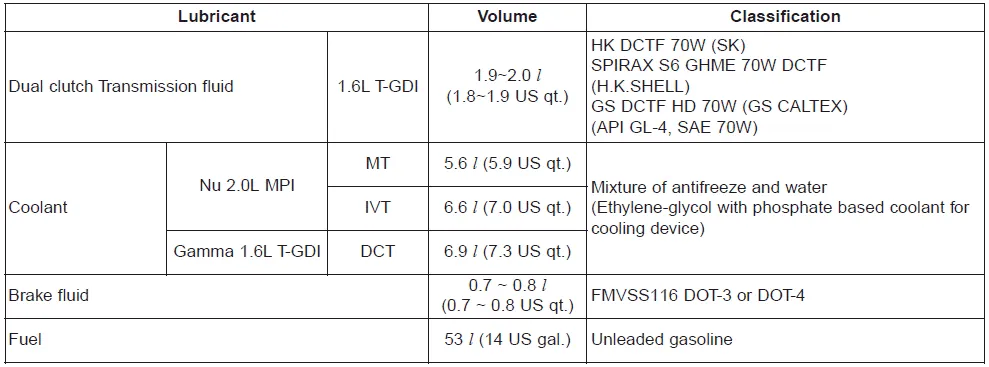Kia Forte: Specifications & Consumer information / Recommended lubricants and capacities
To help achieve proper engine and powertrain performance and durability, use only lubricants of the proper quality. The correct lubricants also help promote engine efficiency that results in improved fuel economy.
These lubricants and fluids are recommended for use in your vehicle.


Recommended SAE viscosity number
Engine oil viscosity (thickness) has an effect on fuel economy and cold weather operating (engine start and engine oil flowability). Lower viscosity engine oils can provide better fuel economy and cold weather performance; however, higher viscosity engine oils are required for satisfactory lubrication in hot weather. Using oils of any viscosity other than those recommended could result in engine damage. When choosing an oil, consider the range of temperature your vehicle will be operated in before the next oil change. Proceed to select the recommended oil viscosity from the chart.

For Fuel economy, it is recommended to use the engine oil of a viscosity grade SAE 5W-30 (API Latest (ILSAC Latest) or ACEA A5/B5). However, if the engine oil is not available in your country, select the proper engine oil using the engine oil viscosity chart.

Dimensions Engine Bulb wattage Tires and wheels CAUTION When replacing tires, use the same size originally supplied with the vehicle.
Vehicle identification number (VIN) ■ VIN label The VIN is also on a plate attached to the top of the dashboard. The number on the plate can easily be seen through the windshield from outside.
Other information:
Kia Forte 2019-2024 (BD) Owner's Manual: Engine oil
Checking the engine oil level ■ Nu 2.0L MPI Engine (Gasoline) ■ Gamma 1.6L T-GDI Engine (Gasoline) 1. Be sure the vehicle is on level ground. 2. Start the engine and allow it to reach normal operating temperature. 3. Turn the engine off and wait for a few minutes (about 5 minutes) for the oil to return to the oil pan.
Kia Forte 2019-2024 (BD) Owner's Manual: Tire terminology and definitions
Air Pressure: The amount of air inside the tire pressing outward on the tire. Air pressure is expressed in kilopascal (kPa) or pounds per square inch (psi). Accessory Weight: This means the combined weight of optional accessories. Some examples of optional accessories are, intelligent variable transmission, power seats, and air c
Categories
- Manuals Home
- Kia Forte Owners Manual
- Light bulbs
- Folding the rear seat
- Fuses
- New on site
- Most important about car
